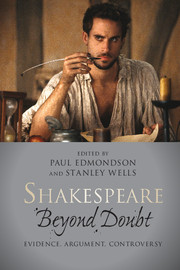Book contents
- Frontmatter
- Content
- List of illustrations
- List of contributors
- General introduction
- Part I Sceptics
- Part II Shakespeare as author
- 6 Theorizing Shakespeare's authorship
- 7 Allusions to Shakespeare to 1642
- 8 Shakespeare as collaborator
- 9 Authorship and the evidence of stylometrics
- 10 What does textual evidence reveal about the author?
- 11 Shakespeare and Warwickshire
- 12 Shakespeare and school
- 13 Shakespeare tells lies
- Part III A cultural phenomenon: Did Shakespeare write Shakespeare?
- Afterword
- A selected reading list
- Notes
- Index
7 - Allusions to Shakespeare to 1642
from Part II - Shakespeare as author
Published online by Cambridge University Press: 05 April 2013
- Frontmatter
- Content
- List of illustrations
- List of contributors
- General introduction
- Part I Sceptics
- Part II Shakespeare as author
- 6 Theorizing Shakespeare's authorship
- 7 Allusions to Shakespeare to 1642
- 8 Shakespeare as collaborator
- 9 Authorship and the evidence of stylometrics
- 10 What does textual evidence reveal about the author?
- 11 Shakespeare and Warwickshire
- 12 Shakespeare and school
- 13 Shakespeare tells lies
- Part III A cultural phenomenon: Did Shakespeare write Shakespeare?
- Afterword
- A selected reading list
- Notes
- Index
Summary
Anyone wishing to suggest alternative nominees for the authorship of Shakespeare's works needs to disprove everything that goes to show that they were written – sometimes in collaboration with other writers – by the William Shakespeare who was baptized on 26 April 1564 in Stratford-upon-Avon and was buried there on 25 April, 1616. The purpose of this chapter is to demonstrate that there is an abundance of such evidence and to set out some of the more significant items.
What is usually taken to be the first printed reference to Shakespeare comes in a book named Greene's Groatsworth of Wit Bought with a Million of Repentance of 1592, written ostensibly by the popular playwright, poet and prose writer Robert Greene, but possibly in part or in whole by Henry Chettle. In it Greene on his deathbed portrays himself, or is portrayed by Chettle, as attacking an ‘upstart Crow, beautified with our feathers, that with his Tiger's heart wrapped in a Player's hide, supposes he is as well able to bombast out a blank verse as the best of you: and beeing an absolute Johannes fac-totum is in his own conceit the only Shake-scene in a country.’ There are two strong reasons to identify the object of attack with Shakespeare. One is that the words ‘Tiger's heart wrapped in a Player's hide’ parody a line from Shakespeare's play Richard Duke of York (Henry VI Part Three) in which the Duke of York inveighs against Queen Margaret in the words ‘O tiger's heart wrapped in a woman's hide!’ (1.4.138). Another reason is the apparent parody of the name Shakespeare in ‘Shake-scene’. Moreover, soon after the book appeared Chettle published Kind Heart's Dream with a preface in which he offered an apology for not having (presumably in his capacity as publisher or printer) toned down the criticism made in the earlier book. He says that two men had been offended by the attack. He cares nothing for what one of them (usually supposed to be Christopher Marlowe) thinks, but regrets having offended the other, ‘because myself have seen his demeanour no less civil than he excellent in the quality he professes. Besides, divers of worship have reported his uprightness of dealing, which argues his honesty, and his facetious [skilful] grace in writing that approves [demonstrates] his art.’
- Type
- Chapter
- Information
- Shakespeare beyond DoubtEvidence, Argument, Controversy, pp. 73 - 87Publisher: Cambridge University PressPrint publication year: 2013



